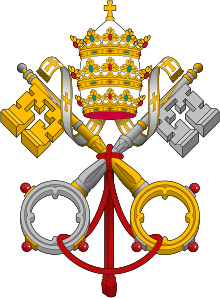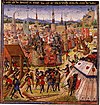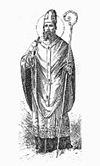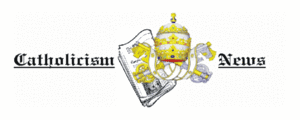Portal:Catholic Church
Introduction The Catholic Church, also known as the Roman Catholic Church, is the largest Christian church, with 1.39 billion baptized Catholics worldwide as of 2022. It is among the world's oldest and largest international institutions, and has played a prominent role in the history and development of Western civilization. The church consists of 24 sui iuris churches, including the Latin Church and 23 Eastern Catholic Churches, which comprise almost 3,500 dioceses and eparchies located around the world. The pope, who is the bishop of Rome, is the chief pastor of the church. The Diocese of Rome, known as the Holy See, is the central governing authority of the church. The administrative body of the Holy See, the Roman Curia, has its principal offices in Vatican City, a small independent city-state and enclave within the Italian capital city of Rome, of which the pope is head of state. The core beliefs of Catholicism are found in the Nicene Creed. The Catholic Church teaches that it is the one, holy, catholic and apostolic church founded by Jesus Christ in his Great Commission, that its bishops are the successors of Christ's apostles, and that the pope is the successor to Saint Peter, upon whom primacy was conferred by Jesus Christ. It maintains that it practises the original Christian faith taught by the apostles, preserving the faith infallibly through scripture and sacred tradition as authentically interpreted through the magisterium of the church. The Roman Rite and others of the Latin Church, the Eastern Catholic liturgies, and institutes such as mendicant orders, enclosed monastic orders and third orders reflect a variety of theological and spiritual emphases in the church. Of its seven sacraments, the Eucharist is the principal one, celebrated liturgically in the Mass. The church teaches that through consecration by a priest, the sacrificial bread and wine become the body and blood of Christ. The Virgin Mary is venerated as the Perpetual Virgin, Mother of God, and Queen of Heaven; she is honoured in dogmas and devotions. Catholic social teaching emphasizes voluntary support for the sick, the poor, and the afflicted through the corporal and spiritual works of mercy. The Catholic Church operates tens of thousands of Catholic schools, universities and colleges, hospitals, and orphanages around the world, and is the largest non-government provider of education and health care in the world. Among its other social services are numerous charitable and humanitarian organizations. (Full article...) Selected article
 The First Crusade was launched in 1095 by Pope Urban II with the dual goals of liberating the sacred city of Jerusalem and the Holy Land from Muslims and freeing the Eastern Christians from Muslim rule. What started as an appeal by Byzantine Emperor Alexios I Komnenos for western mercenaries to fight the Seljuk Turks in Anatolia quickly turned into a wholesale Western migration and conquest of territory outside of Europe.Both knights and peasants from many nations of Western Europe travelled over land and by sea towards Jerusalem and captured the city in July 1099, establishing the Kingdom of Jerusalem and other Crusader states. Although these gains lasted for less than two hundred years, the First Crusade was a major turning point in the expansion of Western power, as well as the first major step towards reopening international trade in the West since the fall of the Western Roman Empire.
Selected image
 Credit: Sanchezn Notre-Dame de Paris, known simply as Notre Dame in English , is a Gothic cathedral on the eastern half of the Île de la Cité in Paris, France, with its main entrance to the west. It is still used as a Roman Catholic cathedral and is the seat of the Archbishop of Paris. Selected biography
 Augustine of Canterbury (died May 26, 604) was a Benedictine monk who became the first Archbishop of Canterbury in 598. He is considered the "Apostle to the English", a founder of the English Church, and a patron of England.Augustine was the prior of a monastery in Rome when Pope Gregory the Great chose him in 595 to lead a mission to Britain to convert the pagan King Æthelberht of Kent to Christianity. Kent was probably chosen because it was near the Christian kingdoms in Gaul, and because Æthelberht had married a Christian princess, Bertha, daughter of Charibert, the King of Paris, who was expected to exert some influence over her husband. Although the missionaries considered turning back before they reached Kent, Gregory urged them on, and in 597 Augustine landed on the Isle of Thanet and proceeded to Æthelberht's main town of Canterbury.
Did you know...

Related portalsFeast Day of June 1
Most of his works are lost, but two apologies and a dialogue did survive. The First Apology, his most well-known text, passionately defends the morality of the Christian life, and provides various ethical and philosophical arguments to convince the Roman emperor, Antoninus, to abandon the persecution of the Church. Further, he also indicates, as St. Augustine would later, regarding the "true religion" that predated Christianity, that the "seeds of Christianity" (manifestations of the Logos acting in history) actually predated Christ's incarnation. This notion allows him to claim many historical Greek philosophers (including Socrates and Plato), in whose works he was well studied, as unknowing Christians. (Full article...)
Selected quote

News
SubcategoriesTopics
The Holy Bible:
Particular Churches (grouped by liturgical rite):
Things you can do
External resourcesWikiProjectsAssociated WikimediaThe following Wikimedia Foundation sister projects provide more on this subject:
Discover Wikipedia using portals |

































